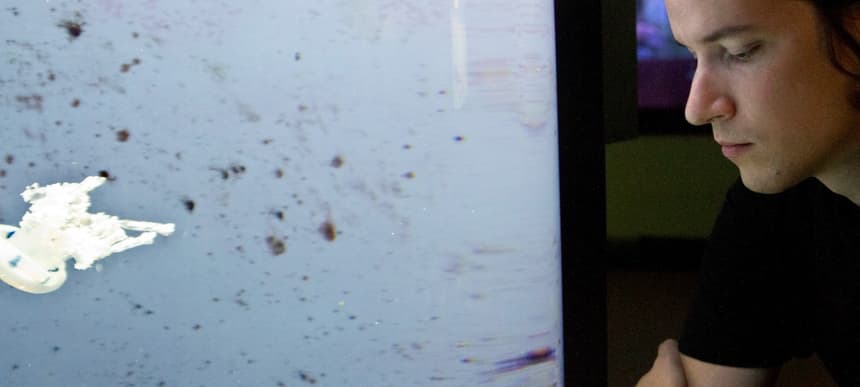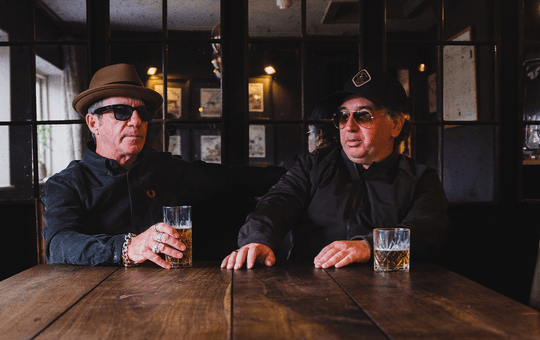
Next: Botany
Botany’s debut album might sound gorgeous, but it comes from an ugly place. Written and recorded over two years and begun when Texan producer Spencer Stephenson was kind of avoiding a criminal assault charge (“from a bar fight that I got in”), ‘Lava Diviner (Truestory)’ is the result of a journey of self-discovery started on a vegetable farm outside Austin, along with a load of other 20-something blow-ins passing through in the few months he was there. When I speak to Stephenson he’s in Forth Werth at his dad’s, a little bleary because the UK-US time difference is so annoying and he has to be up at 9.30am to talk. He’s a little reticent at first, giving monosyllabic answers while offering up some anecdotes-prepared-earlier before elaborating on the encounters in those wilderness years that inspired the stunning impressions of exotic netherworlds in the effervescent tracks of 'Lava Diviner'.
It follows both a spiritual and physical trip, where Stephenson criss-crossed the state through Denton, Austin, Fort Worth, spending a lot of time alone and having plenty of space for introspection. “It’s kinda lofty and a little bit grandiose whenever I think back on it”, he says about the concept behind ‘Lava Diviner’: an imagined scifi future where a self-destructive cult invokes the supervolcano, a large igneous province laying dormant beneath North America that could theoretically end humanity. "Eventually they get what they want but they realise that they’ve destroyed the entire world.” It's such a bleak premise for such a beautiful sound, but then there’s an awe-inspiring universe of textures, moods and emotions that Botany draws from, offering a true sense of the sublime, so often frightening.
Not only that, but when your brother’s in the Peace Corps in Gambia, there’s inevitably going to be a private knot of anxiety that you carry around with you and a solace to be sought in sound (“the record is actually dedicated to him”). So there's a personal connection to these African threads that weave themselves through ‘Lava Diviner’, via the stacks of his brother’s records that inform his musical palette.
Tugged along a fluid organic-synthetic interaction of samples, across strings in the dreamy ebb of Celeste and live drums in Sunna / Show Me, Stephenson crafts a cybernetic fantasy reflecting his dual nature: an electronic producer working from a laptop who also describes himself as a “naturalist”. He can see the same beauty in a flower as physicist Richard Feynman, whose ‘Ode on a Flower' he references but doesn’t quote for fear of “absolutely butcher[ing]” it. But basically it applies to a similar sense of “natural wonder” in the anatomy of a plant as much as its aesthetic value, which is where he gets his sense of spirituality, “not to be too hippy about it”.
Hence the name Botany, I guess. Stephenson’s previous project name, Abacus, was dropped the minute he found someone else had it – even if a quick search of this current one is bound to “come up with a lot of science results”. Interestingly, Stephenson doesn’t get the New Age comparisons but loves folk and prog rock. Laughtrack, a track that doesn’t appear on the album, features vocals from Father John Misty (ake J Tillman of Fleet Foxes). He prefers samples from the 60s and 70s over the “frigid, or glossy or sharp” sound “of anything that, in my mind, is the cliché about electronic music.” Tangerine Dream, Greek artist Iasos and “even some Vangelis” it is, then.
Not to be confused with any perceivable 90s “ethno electro” associations, the African and South American influences are less about exoticised ‘world sounds’ and more about the fact Stephenson is a drummer (“first and foremost”) and, “without sounding too naïve”, there’s a powerful percussive element that these styles move him. Not only that, but it’s the “almost progressive rock visual artists” like the wondrous scenes of Roger Dean (basically in-house artist to YES) and the surreal graphic art of Killian Eng that inspire Stephenson’s vast sonic impressions. And that’s not mentioning Arthur C. Clarke’s sci-fi classic, Childhood’s End: “I was really inspired by the grandness of the landscapes that he created in that book”. But, most significantly, it was the mass hysteria of the 2012 Mayan calendar ‘prediction’ that got Stephenson really thinking. “I was really curious as to why everybody was so hungry for the world to end”, he says. Because, beyond mere quacks, this “apocalypse mongering” seems to persist throughout history, for faithful and non-believer alike: “there are tonnes of secular analogues for a lot of ritual”.
So, in his quest for self-actualisation and after overcoming the “rat race that is the legal system”, Spencer Stephenson has few reservations about sharing his chequered past with the world. “I feel compelled to put it across that I wasn’t making this music from this purely happy place," he says, making 'Lava Diviner (True Story)' the vessel in which he can finally move on.
Western Vinyl released 'Lava Diviner (True Story)' on the 28th October 2013.
This post was edited on 04/11/13.













